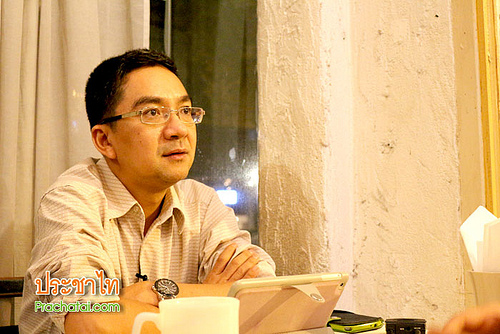The Asian Human Rights Commission (AHRC) is gravely concerned to have learned that Professor Worachet Pakeerut, an associate professor in the Faculty of Law at Thammasat University, leader of the Khana Nitirat, and human rights defender (HRD), has been charged in the Bangkok Military Court with violating an order of the National Council for Peace and Order (NCPO). Professor Worachet has been granted bail at this time. This is a clear instance of targeting an HRD for his ideas and actions in support of human rights.

Professor Worachet, a lawyer and HRD, was just charged in military court. Image Courtesy: Prachatai
The Khana Nitirat, or as they are called in English, the “Enlightened Jurists,” is a group of seven law lecturers at Thammasat University who have carried out academic work and advocacy in the service of expanding knowledge about rights and law in Thailand since 2009. They have courageously raised urgent questions about who has access to human rights in Thailand, and whose rights are routinely denied as a matter of rule and course. Of particular significance, their statements, articles, and seminars aim to make law accessible to the people, rather than only a tool of a narrow network of experts. The work of the Khana Nitirat has unsettled state, military, and other elites from its inception, and the members have frequently been targets of online and other threats. In February 2012, Professor Worachet was physically assaulted outside his office at Thammasat University by two young men who later admitted that they assaulted him because they disagreed with his ideas (AHRC-STM-040-2012).
Since the first days after the coup was launched on 22 May 2014, the NCPO has explicitly targeted academics, human rights defenders, journalists, artists, and dissident thinkers. Professor Worachet Pakeerut has been among those targeted by the junta since the beginning. He was included on the list of persons named in Order No. 5/2557 [2014] on 23 May, which was broadcast on the radio and television and demanded that those named themselves to the Army Club on auditorium at Thewet Road by 4 pm on 24 May. Several weeks later, he was named again in Order No. 57/2557 [2014] on 9 June which was broadcast on the radio and television and demanded that those named themselves to the Army Club on auditorium at Thewet Road by 4 pm on 10 June.
According to information provided by Prachatai, Professor Worachet’s wife reported to the junta at the Army Club on Thewet Road on 11 June that her husband was unwell and unable to report himself at that time. Subsequently, Professor Worachet reported himself to the junta at the Army Club on Thewet Road on the afternoon of Monday, 16 June. He was taken into custody after he reported himself to the junta. He was then detained overnight at the base of the 11th Regiment King’s Guards in Bangkok and taken the next morning back to the Army Club. On the morning of Tuesday, 18 June, he was sent to the Crime Suppression Division for further investigation. On the afternoon of 18 June, he was sent to the Bangkok Military Court to be formally charged with violating an order of the NCPO. The penalty for violating an order of the NCPO carries a maximum prison term of two years and a 40,000 baht fine.
The AHRC is particularly concerned that Professor Worachet will be processed in a military court under the Constitution of Military Courts Act B.E. 2498 [1955]. In the past two weeks, several other HRDs, including Jittra Kotchadet, a labour activist and HRD, have also been charged in military court in relation to being summoned to report by the junta (AHRC-STM-109-2014). In an open letter to the United Nations Special Procedure mandate holders on 2 June 2014 (AHRC-OLT-006-2014), the AHRC detailed the particular potential rights violations possible during military court processes. The use of military courts is a clear derogation of Thailand’s responsibilities as a state party to the International Covenant on Civil and Political Rights. While the junta has claimed, through the use of martial law, that the current social and political situation represents a public emergency in which the derogation of responsibilities is permitted, the AHRC’s assessment is that no such situation exists to justify the establishment of these courts in Thailand at this time. Despite the country’s ongoing political unrest, much of which dates to the prior coup in September 2006, it is beholden on the civilian authorities to deal with that unrest in accordance with ordinary procedures. Despite the assurances of authorities that they will respect human rights, the consistent experience in Thailand has been that where special laws have been used, people affected by the laws have encountered a corresponding increase in cases of arbitrary detention, torture and denial of due process rights. Nothing in the present circumstances offers reassurances that the same will not occur through the establishment of military courts under martial law.
The Asian Human Rights Commission unequivocally condemns the coup in the strongest terms and wishes to express grave concern about the rapid decline of human rights protections it has engendered. The AHRC calls on the NCPO to immediately release all citizens being arbitrarily detained without charge and to cease creating public terror by issuing blanket summons to report to the military. The legal processes against Professor Worachet and all other civilians in military courts are illegitimate and all charges should be immediately dropped, and anyone currently being detained in relation to charges in the military court should be released. Further, the AHRC calls on the NCPO to recognize that tolerance for different ideas and dissent are part of building a polity grounded in human rights and the rule of law. To think differently than the junta is not a crime.